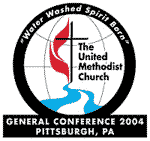United Methodist Church
General Conference 2004
Pittsburgh, April 27–May 7
This Holy Mystery
"United Methodists are hungry for a better understanding and a richer experience of Holy Communion than what is practiced in their churches."
That’s the finding of a study committee that, for the past four years, has been working to clarify United Methodist Holy Communion tradition, theology and practice to give the denomination a positive vision of what the sacrament can be in local churches.
Holy Communion was prominent in Methodist churches in the formative days of our denomination. As we have progressed through the years it has diminished in importance in many places. Why is that? Are we content with this? These are the questions the study was seeking to address. The study is complete and delegates to General Conference will be asked to adopt two pieces of legislation regarding the study. The first is to adopt the study document as the official interpretive statement of the theology and practice of Holy Communion in the denomination. The document is also intended to help the church be in accord with ecumenical movements in sacramental theology and practice.
One of the most important components in the interpretive report is the section on grace and the means of grace, according to the Rev. Gayle C. Felton, the author of the Holy Communion document. United Methodists have always talked a great deal about grace, but its meaning may not be clear, especially to those who are most active in the church, she pointed out. Felton said the document’s portion on grace clarifies the church’s Wesleyan tradition and specifies how the sacraments can be best understood as a special but not exclusive means of grace.
The document addresses a controversy across the denomination about who is welcome at the table or to whom the invitation is given: Is Holy Communion only for the baptized or is it open to everyone? Who is worthy to receive it?
Concerns about unworthiness are based largely on misinterpretation and false fears. “Within the United Methodist tradition, people who participate in the sacrament are assured of the forgiveness of their sins and of pardon through their participation in the Invitation and the Confession and Pardon,” the document states. It further asserts that the table is open to all who would partake of the sacrament. This is consistent with our practice at First Church. When the document is complete and study materials are printed, we will make it available to our congregation.
Debbie Fisher


